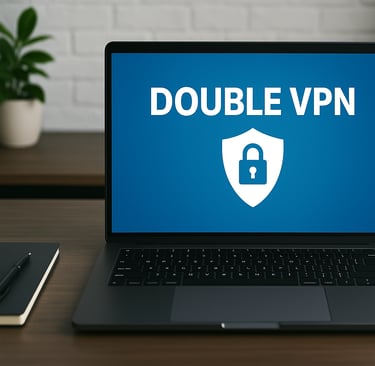Double VPN and Multi-Hop Connections Explained
VPN


Most people use a VPN to encrypt their traffic and hide their IP address. But for users who want extra layers of security, some VPN services offer features like Double VPN or Multi-Hop connections. These advanced options route your traffic through more than one VPN server, making it much harder for anyone to trace or intercept your online activity.
Here’s everything you need to know about how they work, their benefits, and whether they’re right for you.
What Is Double VPN?
Double VPN (sometimes called multi-hop VPN) means your internet traffic passes through two VPN servers instead of one.
For example:
You connect to a VPN server in Germany.
Your traffic is then routed through a second server in Canada.
Only after that does it reach the internet.
Each “hop” adds another layer of encryption and IP masking.
How Multi-Hop VPNs Work
Some providers allow you to chain more than two servers together. This is called multi-hop and can involve three or more servers, depending on the service.
Single VPN: Device → VPN Server → Internet
Double VPN: Device → VPN Server 1 → VPN Server 2 → Internet
Multi-Hop VPN: Device → VPN Server 1 → VPN Server 2 → VPN Server 3 → Internet
Each hop makes it more difficult for trackers, governments, or hackers to follow your trail.
Benefits of Double VPN and Multi-Hop
1. Enhanced Privacy
Each server hides your IP address, so even if one server were compromised, your identity would remain protected.
2. Stronger Encryption
Some services apply double encryption, scrambling your data twice. While this isn’t always necessary, it provides additional security.
3. Protection Against Malicious Servers
If one server is compromised (for example, by a government or ISP), the second server still masks your activity.
4. Anonymity in High-Risk Environments
Journalists, activists, and whistleblowers often rely on multi-hop connections when working in restrictive regions.
Drawbacks of Double VPN and Multi-Hop
1. Reduced Speed
More hops mean more distance and processing, which can slow down your connection.
2. Not Always Necessary
For everyday browsing or streaming, single-server VPNs are more than enough.
3. Limited Availability
Not all providers offer multi-hop connections, and some only support a few preconfigured routes.
4. Higher Power Usage on Mobile
Extra encryption can drain battery faster on smartphones.
Who Should Use Double VPN or Multi-Hop?
Privacy-conscious users who want maximum protection.
Journalists and activists working in countries with heavy censorship.
Business professionals handling sensitive data on insecure networks.
Whistleblowers or investigators needing extra anonymity.
For regular users, a standard VPN connection is secure enough for streaming, shopping, and general browsing.
Examples of VPNs Offering Double VPN / Multi-Hop
NordVPN – Double VPN option with specific server pairs.
Surfshark – Multi-Hop feature with customizable routes.
ProtonVPN – Secure Core servers for routing traffic through privacy-friendly countries first.
IVPN – Customizable multi-hop with multiple exit nodes.
Best Practices for Using Multi-Hop VPNs
Choose Trusted Providers – Extra hops won’t help if your VPN provider logs your activity.
Use Nearby Servers First – Start with closer hops to reduce speed loss.
Combine with Other Tools – For maximum privacy, use Tor over VPN or pair with secure browsers.
Enable Kill Switch – Prevents accidental leaks if a connection drops.
Test Speeds – Use speed tests to find the best balance between privacy and usability.
Final Thoughts
Double VPN and Multi-Hop connections are advanced features that add layers of encryption and anonymity. While they aren’t necessary for every user, they provide an invaluable shield for people in high-risk environments or those who demand maximum privacy.
For most everyday needs, a single VPN server provides plenty of security. But when privacy is paramount, multi-hop connections can give you the confidence that your online activity is hidden behind multiple barriers.